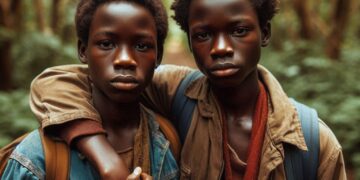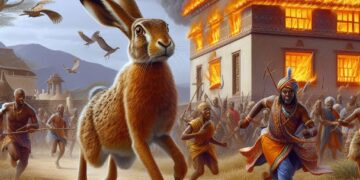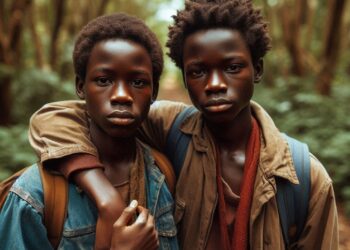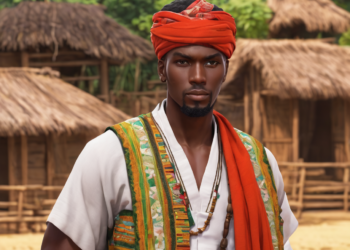Long time ago, in the heart of the Ugandan countryside, nestled around the village of Gomba, there brewed a fierce battle. The clash of swords and the thundering hooves of war echoed through the air, sending tremors of fear and uncertainty across the landscape. Amidst this chaotic turmoil, a humble but extraordinary story unfolded.
In the heart of Gomba, there lived a man who, since the day he was born, had never felt the solid ground beneath his feet. This unfortunate soul was a lame man, condemned to a life where walking was but a distant dream. Every morning, he was tenderly carried out into the sunny courtyard, and every evening, he was gently transported back to the confines of his house. The villagers, consumed by the tumultuous battle outside, had long forgotten the existence of the lame man.
As the clash of steel continued unabated, the lame man lay in his house, his eyes gazing out into the world through the narrow window. It was during one such moment that he spotted a blind man navigating the tumult outside. A spark of inspiration ignited within the lame man, and he called out to the blind traveler.
“Come here, my friend! I have something important to tell you,” he cried, his voice cutting through the chaos like a beacon in the night. The blind man, guided by his trusty long stick, made his way to the source of the voice until he stood before the lame man, curious and intrigued.
“Listen, my friend,” the lame man began, his voice a whisper amidst the tumult. “No one remembers us in this battle, and surely we are fated to perish – you, blind, and I, lame. But I have a plan. Carry me on your back, and together, we shall escape from this village. I will be your eyes, and you shall be my feet.”
The blind man, captivated by the audacity and brilliance of the plan, agreed without hesitation. With a determined spirit, he hoisted the lame man onto his back, forming an unlikely alliance bound by necessity and survival. Together, they maneuvered through the chaos, navigating the perilous path to safety.
As they reached the relative calm outside the war-torn village, a sense of accomplishment filled the air. However, their unity was short-lived as a dispute arose over who had truly saved the other’s life. The blind man, feeling entitled to a reward, demanded recognition for his heroic act. In contrast, the lame man staunchly insisted that it was he who had saved the blind man.
The escalating disagreement caught the attention of the villagers, and word quickly spread to the Chief’s ears. Intrigued by the unique circumstance, the Chief called for a council to settle the dispute. When the case was presented, the Chief listened attentively, pondering the words of the two protagonists.
In a moment of wisdom, the Chief proclaimed, “There is no case here. The lame man was the eyes to the blind, and the blind man was the feet to the lame. Both have saved each other’s lives, which, in itself, is a great reward. The words are finished.”
With these wise words, the Chief put an end to the dispute, recognizing the equal importance of the roles played by the blind man and the lame man. The villagers, witnessing this unique resolution, were inspired by the Chief’s wisdom and declared, “It is a case of the Quits of Gomba” whenever they encountered a situation where both parties were right or wrong.
And so, in the aftermath of the battle, a proverb was born, echoing through the hills of Uganda—a testament to the enduring power of cooperation and the importance of recognizing the value each individual brings to the table, especially in times of adversity.















